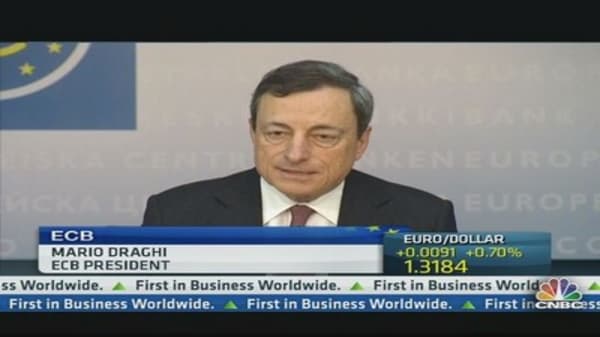The European Central Bank's bond buying program, widely credited with drawing a line under the region's crisis, is to undergo scrutiny in Germany's top court this week, prompting fears that the judges could pull the plug on a policy that has played a big part in calming financial markets.
Germany's constitutional court in the south-western city of Karlsruhe is set to hold a public hearing on Tuesday and Wednesday on the legality of the European Central Bank's bond buying plan after receiving complaints that the ECB was over-stepping its remit from, among others, the country's own central bank, the Bundesbank.
The case pits the ECB directly against Germany's central bank. Bundesbank President Jens Weidmann, a vocal critic of the ECB's bond buying plan, and the ECB's German executive-board member Jörg Asmussen are both expected to testify on opposite sides of the argument during the hearing, according to various media reports.
(Read More: Hearing Pits German Monetary Heavyweights Against Each Other)
Germany's central bank has criticized the "Outright Monetary Transactions" (OMT) program announced in August 2012. In December, it sent a 29-page report report to the court warning that buying government debt could compromise the independence of the ECB, undermine German budgetary sovereignty and be difficult to wind up once implemented.
The panel of eight judges are not expected to give their ruling until later this year and the case could yet be referred to the European Court of Justice. In an extreme case, the case could ultimately cause the collapse of the euro zone, according to one former constitutional court judge.
"In so far as the ECB is acting 'ultra vires', and these violations are deemed prolonged and serious, the court must decide whether Germany can remain a member of monetary union on constitutional grounds," Udo di Fabio wrote in a report for the German Foundation for Family Businesses.
Chris Scicluna, head of Economic Research at Daiwa Capital Markets said in a note on Monday that while the Court is unlikely to dismiss the case out of hand, most German constitutional law experts also do not expect the Court to rule explicitly that the OMT program breaches the German constitution.
"Instead, most Court observers expect the judges to define explicitly which monetary policy measures it considers in line with the European Treaty and the German constitution, thereby possibly constraining the scope of the OMT program," he wrote.
Germany Hesitant
With national elections due in September, the bond buying program and the fact that it could expose German taxpayers to further losses is a hot-button issue.





